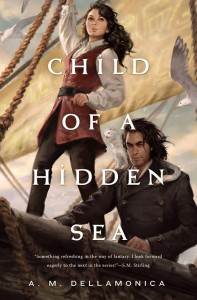 Title: Child of a Hidden Sea (Hidden Sea Tales #1)
Title: Child of a Hidden Sea (Hidden Sea Tales #1)
Author: A.M. Dellamonica
Publisher: Tor Books on June 24, 2014
Source: Publisher
One minute, twenty-four-year-old Sophie Hansa is in a San Francisco alley trying to save the life of the aunt she has never known. View Spoiler »
Before I begin this review, let me state for the record: this book was okay, but I wanted to like it so much more than I actually did. I am not too proud to admit that the cover sucked me in, and I completely bought into its promises of pirates, swashbuckling, and swoon-worthy romance. I was disappointed on all counts, but pleasantly surprised by some other aspects.
When I first began Child of a Hidden Sea, it took me a few chapters to get used to Sophie’s first-person narration, since it seemed so awkward at first. She kept asking herself rhetorical questions about the cultural elements of Stormwrack’s nations, its geography, and magic. After thinking about it for a while, I realized that Sophie’s narrative voice – her questions, concerns – actually reminded me of my own thought process when I begin reading an SF/F novel. Just as readers need time to digest the cultural, political, and magical systems of a new universe, so too did Sophie.
And man, was there a lot to digest. Child of a Hidden Sea has excellent world-building, with a rich tapestry of peoples, cultures, and several types of magic. I loved the concept of the fleet, essentially a floating city comprised of hundreds of ships belonging to the different island nations of Stormwrack. The system of inscribing names and “intents” onto items and then utilizing these items as focuses for magical power was already really cool. It’s pretty fitting that names are so important in a book where the protagonist is desperate to find her birth parents.
My one complaint about the otherwise flawless world-building is about the portal between Earth and Stormwrack. Maybe it’s just the nature of portal fantasy to be a bit vague on the details, but I would have liked more explanation as to why exactly technology from Earth or “Erstwhile” worked in Stormwrack with few problems. Sure, Sophie’s cell didn’t have service, but her video camera worked fine. Obviously a lot of SFF requires you to suspend your disbelief, but I think Dellamonica was asking a bit much when she expected readers to buy the fact that no one batted an eye at Earth’s technology. Stormwrack seriously needs to tighten up their security if they want to remain a secret.
Sophie’s insecurities made her both sympathetic and mildly annoying. Yes, we get it, your little brother’s a genius and you have a complex about it. Deal with it, girl! She’s no slouch herself, with a practically encyclopedic knowledge of flora and fauna and advanced scuba diving skills. I found it frustrating that Dellamonica constantly dithered about Sophie’s intellectual insecurity but couldn’t find the space to make the explicit connection between her career on Earth as an adventurer-at-sea and the fact that Sophie’s parents belong to a world LITERALLY ON THE SEA. I suspect the lack of commentary on the subject was intentional, but clearly Demllamonica is a ‘teller’ and not a ‘shower’ so I’m not sure what that was about.
Although I thought Sophie was a fairly weak character, her brother Bram was wonderful. He encompasses many extremes but somehow avoids caricature status, remaining realistically three-dimensional. He’s a gay genius with a killer sense of style and a dry sense of humor whose favourite alkaloid is coffee. That’s kind of a lot to process, but it totally works. I also liked his catch phrase, “sub-optimal,” since it fit his geeky/droll sense of humour perfectly.
I liked this enough to read the sequel (if there is one), but I won’t be re-reading it. Here’s hoping that both Dellamonica’s writing, and her protagonist, become a bit more adult.
*A digital copy of this book was provided by the publisher for review, but that in no way influences my opinions on it.